Odkąd zaczęłam dzielić się na instagramie szczegółami dotyczącymi mojego zdrowia psychicznego, ten temat stał się niezwykle popularny wśród moich obserwatorek i obserwatorów. To tylko pokazuje, jak znacząca jest skala problemów psychicznych i że każdy z nas zna kogoś, kto cierpi z tego powodu, lub sam jest taką osobą.
Książki psychologiczne dla leczących się na depresję?
Z terapeutką spotykam się raz w tygodniu, a czas pomiędzy spotkaniami przeznaczam na przemyślenie tematów, które poruszyłyśmy. Często mam także zadawane “ćwiczenia”, które powinnam wykonać. Jedno z nich robiliśmy kiedyś wspólnie pod jednym z postów na instagramie.
Książki psychologiczne okazały się bardzo pomocne do zrozumienia teoretycznych aspektów moich problemów, do poczytania o ich źródłach, a także wykonania ćwiczeń, które takie pozycje często uwzględniają.
Darmowe książki dotyczące depresji dostępne są na stronie Forum Przeciw Depresji

Nie tylko depresja!
Poniższa lista nie jest uniwersalna – jest moja. To książki, które na różnych etapach były mi polecane przez terapeutkę ze względu na moje problemy, okoliczności, ale także na zainteresowania. Jest PTSD, miłość, są emocje, związki, a także narcyzm. Część z nich jest anglojęzyczna – raz, że wybór literatury w tym języku jest znacznie większy, a dwa, że dla mnie było to obojętne.
Opisy książek anglojęzycznych pozostawiam po angielsku – raz, że jest to dla mnie duże ułatwienie, a dwa, że pozwoli Wam to ocenić, czy językowo dacie radę przeczytać całość.
Vivian Natalia Fiszer, Terapia dialektyczno-behawioralna. Trening umiejętności
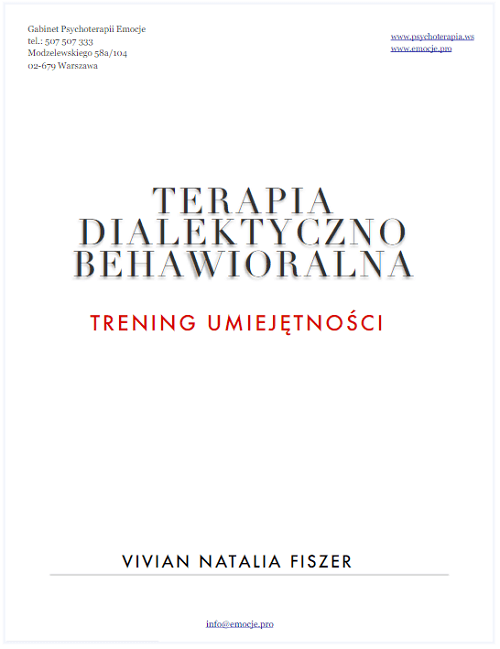
Trening do trenowania, a nie książka do czytania
Trening Umiejętności stosowany w borderline, depresji, uzależnieniach, intensywnych emocjach, samouszkodzeniach, bulimii, aczkolwiek moja terapeutka twierdzi, że świetnie nadaje się dla każdego człowieka.
Darmowy zestaw ćwiczeń udostępniany przez emocje.pro. Warto przeczytać opis znajdujący się tutaj, a jeśli po przejrzeniu stwierdzimy, że to coś dla nas, koniecznie wydrukować i zacząć ćwiczyć!
Nic nie zastąpi terapii, ale nie każdy może sobie na nią pozwolić. Taki trening daje jednak szanse na lepsze zrozumienie siebie i zdecydowanie zadziała lepiej niż nierobienie niczego.
Trening Umiejetnosci Terapi… by Vivian Fiszer
Marsha M. Linehan, Terapia Dialektyczno-Behawioralna (DBT) Trening Umiejętności Materiały i Ćwiczenia dla Pacjentów
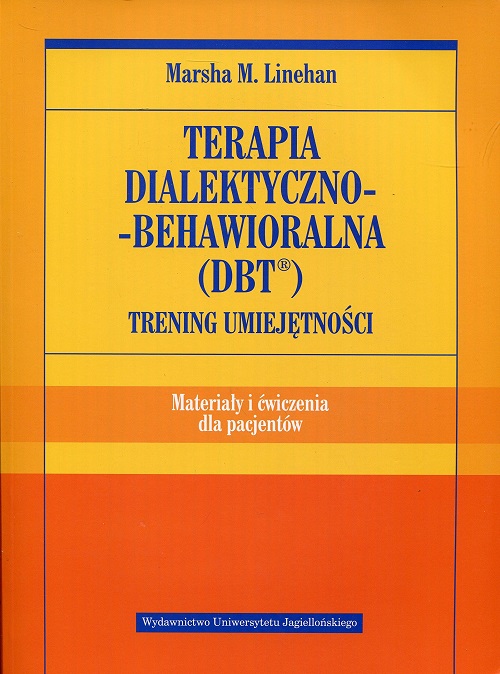
Opis ze strony sklepu:
Trening umiejętności DBT pomaga zwiększyć odporność i budować satysfakcjonujące życie, uczy, jak zmienić niepożądane zachowania, emocje, myśli i zdarzenia oraz jak żyć chwilą, akceptując to, co jest. Zdobyte umiejętności będą przydatne dla przyjaciół i członków rodzin osób z trudnościami, skorzystać mogą na nich także dzieci ze szkół podstawowych i średnich, a przedsiębiorcy wykorzystać do stworzenia lepszego środowiska pracy.
Terapia dialektyczno-behawioralna jest skuteczna w leczeniu młodzieży z tendencjami samobójczymi, a także dorosłych z zaburzeniem osobowości z pogranicza, zaburzeniami odżywiania się, oporną na leczenie depresją, nadużywających substancji psychoaktywnych i borykających się z wieloma innymi chorobami. Diagnoza zaburzenia psychicznego nie jest jednak konieczna do tego, aby odnieść korzyść z umiejętności DBT.
Dzięki tej publikacji pacjenci biorący udział w treningu umiejętności DBT uzyskają szybki i łatwy dostęp do zalecanych narzędzi spełniających ich indywidualne potrzeby. Książka zawiera bowiem ponad 225 przystępnie napisanych ulotek i kart do samodzielnej pracy według czterech głównych modułów umiejętności DBT: uważności, skuteczności interpersonalnej, regulacji emocji oraz tolerancji dolegliwości psychicznych.
Clark David A. , Beck Aaron T., Zaburzenia lękowe. Podręcznik z ćwiczeniami opartymi na terapii poznawczo-behawioralnej
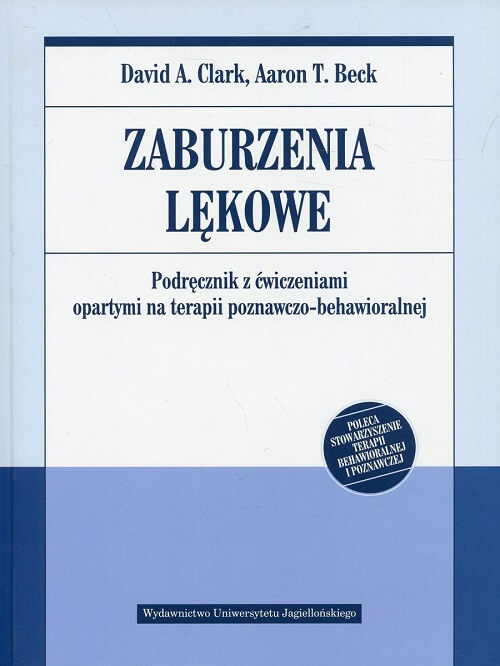
Opis wydawcy:
Praktyczny podręcznik opracowany przez największe autorytety nurtu CBT.
Zaburzenia lękowe należą do najbardziej powszechnych zaburzeń psychicznych – trwale uczucie niepokoju, zamartwianie się czy ataki paniki w istotny sposób ograniczają komfort życia. Niniejsza książka, napisana przez wybitnych specjalistów w dziedzinie terapii poznawczej, pomaga w zrozumieniu własnego lęku i stopniowej zmianie sposobu myślenia, a w konsekwencji w odzyskaniu dobrego samopoczucia i równowagi psychicznej. Pozycja ta, dzięki przystępnemu językowi i licznym, praktycznym poradom, sprawdzi się doskonale jako lektura samopomocowa. Będzie też stanowić świetne uzupełnienie biblioteczki psychoterapeutów i klinicystów – szczególnie prowadzących terapię zaburzeń lękowych oraz zainteresowanych nurtem CBT – dostarczając materiałów przydatnych do pracy z pacjentem.
Ten praktyczny podręcznik stworzono, opierając się na wieloletnim doświadczeniu klinicznym. Zawarte w nim kwestionariusze, ćwiczenia i przykłady pomagają w skutecznym ograniczeniu lęku – w szczególności panicznego, społecznego i uogólnionego. Uczą, w jaki sposób rozpoznawać czynniki, które go uruchamiają; pokazują jak pozbyć się natrętnych myśli i oderwanych od rzeczywistości przekonań leżących u jego podstawy, pozwalają poczuć się bezpieczniej w stresujących okolicznościach i stawić czoła sytuacjom wywołującym panikę.
“Kup ten nieoceniony podręcznik, gdy będziesz gotów rzucić wyzwanie lękowi i zrobić wszystko, by się z nim uporać. Clark i Beck to wybitni znawcy terapii poznawczej pozwalającej osiągnąć najwyższe na świecie wskaźniki skuteczności w leczeniu lęku. Masz teraz okazję skorzystać z porad wybitnych fachowców, dążąc do spokojniejszej, szczęśliwszej przyszłości”.
Dr Christine A. Padesky, współautorka książki “Umyśl ponad nastrojem”
Rosenberg B. Marshall, Porozumienie bez przemocy. O języku życia
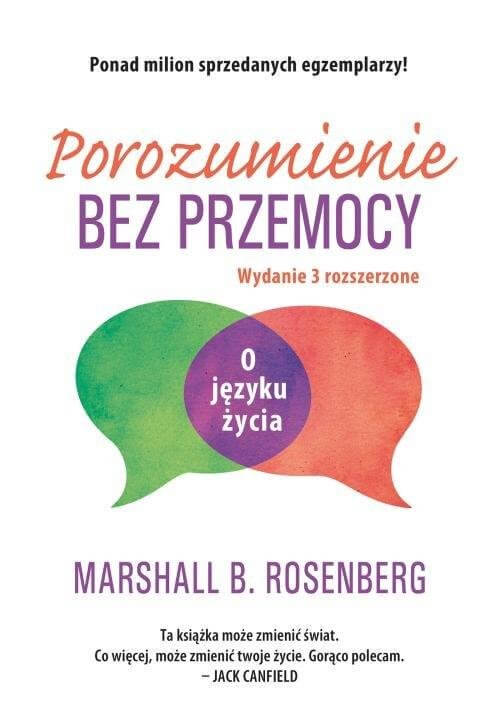
Opis wydawcy:
Nowe wydanie “Porozumienia bez przemocy: o języku życia” Marshalla Rosenberga wzbogacone zostało o obszerny rozdział na temat mediacji w duchu PBP – zupełnie niepodobnych do klasycznych mediacji, z którymi ktokolwiek z nas miał szansę się zetknąć. Punktem wyjścia w procesie opisywanym przez Rosenberga jest, jak i w całej jego metodzie, kontakt międzyludzki na poziomie serca, bez którego mediacje nie mogą się w ogóle rozpocząć. Inny jest też cel: Rosenberg jako mediator nie dąży do kompromisu, lecz – uwaga! – do tego, by każda ze stron zakończyła konflikt w pełni usatysfakcjonowana. Brzmi niewiarygodnie, lecz, jak udowadnia autor na licznych przykładach ze swojej pracy, jest to możliwe.
Behary Wendy, Rozbroić narcyza. Jak radzić sobie z osobą zapatrzoną w siebie

Opis wydawcy:
Narcyz to osoba zapatrzona w siebie i sobą zachwycona. Takich ludzi możemy spotkać wszędzie: w szkole, w pracy, w domu… Autorka książki pokazuje, jak sobie z nimi radzić. Wyjaśnia, gdzie leżą źródła narcyzmu, dlaczego ulegamy urokowi narcyzów i jak zadbać o siebie, gdy nasz partner lub rodzic jest narcyzem. Odwołuje się przy tym do nowatorskiej koncepcji terapii schematów i do zasad neurobiologii interpersonalnej. To doskonały przewodnik przetrwania dla osób będących w relacji z narcyzem, a także nieocenione źródło wiedzy dla terapeutów prowadzących terapię osób narcystycznych.
Bessel van der Kolk, The Body Keeps the Score: Mind, Brain and Body in the Transformation of Trauma
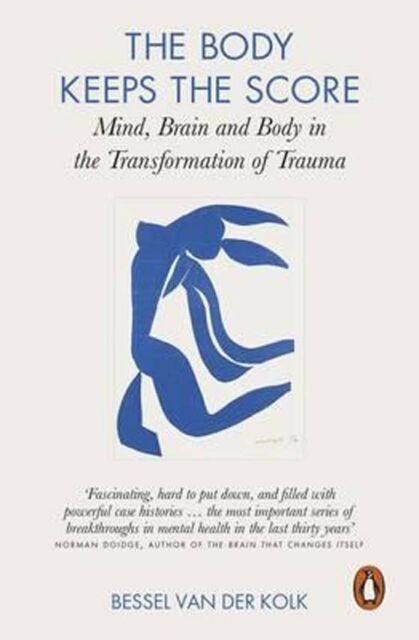
Książka, dzięki której zaczęłam lepiej rozumieć to, jaki wpływ ma na mnie zespół stresu pourazowego (PTSD)
Opis wydawcy:
‘Dr. van der Kolk’s masterpiece combines the boundless curiosity of the scientist, the erudition of the scholar, and the passion of the truth teller’ Judith Herman, author of Trauma and Recovery
The effects of trauma can be devastating for sufferers, their families and future generations. Here one of the world’s experts on traumatic stress offers a bold new paradigm for treatment, moving away from standard talking and drug therapies and towards an alternative approach that heals mind, brain and body.
Bethany Key, Complex PTSD Trauma and Recovery: A Step By Step Guide To Survive From PTSD. Learn To Manage Negative Emotions, Overcome Trauma, And Become Whole
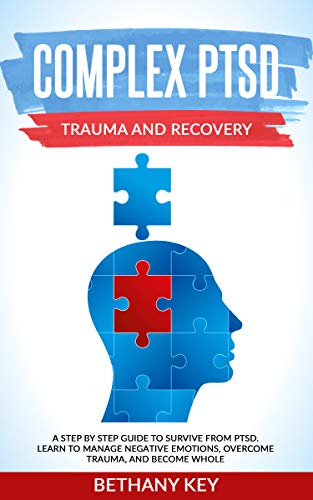
Opis wydawcy:
We all experience terrible and frightening events at certain points in our lives. And along with these experiences, it is only normal for us to feel afraid, nervous, and anxious, to have a hard time forgetting what happened, or to be unable to sleep well after the incident. These feelings and experiences are considered to be normal reactions of the body to such situations, and typically, these unpleasant emotions eventually ebb over time, and the individual involved is able to successfully get back to his or her normal day to day life. However, this is not always the case for everyone.
For some people, the unpleasant emotions that come with a terrifying experience become seemingly insurmountable, even long after the horrifying event has already passed. This is what constantly haunts individuals who suffer from a certain condition known as Post-Traumatic Stress Disorder (PTSD).For a lot of individuals who went through traumatic experiences, these feelings and reactions may make it difficult to cope and adjust and get back to their normal lives for a while.
This book covers:
- Understanding PTSD
- Symptoms of CPTSD
- PTSD Symptoms Differential Diagnosis
- Strategies to Recovery
- Dialectal Behavior Therapy
If left unattended, this serious condition could cause a considerable decline in the overall quality of life of the individual and may even inflict even greater damage to his or her overall safety and wellbeing. While it is true that Post-Traumatic Stress Disorder is very difficult to face and deal with, it is also very important to be mindful of the fact that overcoming this particular disorder is also very much possible.
Arielle Schwartz, The Complex PTSD Workbook: A Mind-Body Approach to Regaining Emotional Control and Becoming Whole
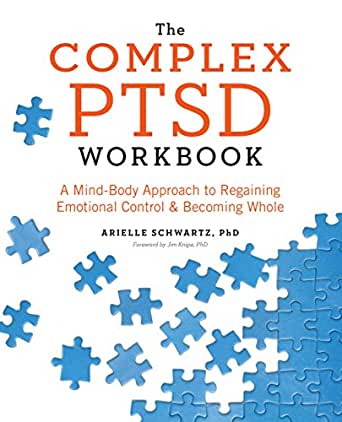
Opis wydawcy:
Activating your mind and body in healing Complex PTSD ― a theaputic workbook
Those affected by complex PTSD commonly feel as though there is something fundamentally wrong with them―that somewhere inside there is a part of them that needs to be fixed. Though untrue, such beliefs can feel extremely real and frightening. Difficult as it may be, facing one’s PTSD from unresolved childhood trauma is a brave, courageous act―and with the right guidance, healing from PTSD is possible.
Clinical psychologist Dr. Arielle Schwartz has spent years helping those with C-PTSD find their way to wholeness. She also knows the territory of the healing firsthand, having walked it herself. This book provides a map to the complicated, and often overwhelming, terrain of C-PTSD with Dr. Schwartz’s knowledgeable guidance helping you find your way.
In The Complex PTSD Workbook, you’ll learn all about C-PTSD and gain valuable insight into the types of symptoms associated with unresolved childhood trauma, while applying a strength-based perspective to integrate positive beliefs and behaviors.
Useful features of The Complex PTSD Workbook include:
Examples and exercises through which you’ll discover your own instances of trauma through relating to PTSD experiences other than your own, such as the following:
[Example] Diane was very skilled at avoiding dealing with her traumatic past. To survive, she had learned to bury her painful feelings and memories, preferring not to talk about her childhood. It simply hurt too much.
[Exercise] In what ways can you relate to Diane’s story? Take some time to write down any associations you have.
Information about common PTSD misdiagnoses such as bipolar disorder, ADHD, anxiety disorders, major depressive disorder, and substance abuse, among others.
Explorations of common methods of PTSD therapy including somatic therapy, EMDR, CBT, DBT, and mind-body perspectives.
Chapter takeaways that encourage thoughtful consideration and writing to explore how you feel as you review the material presented in relation to your PTSD symptoms.
The Complex PTSD Workbook aims to empower you with a thorough understanding of the psychology and physiology of C-PTSD so you can make informed choices about the path to healing that is right for you and discover a life of wellness, free of C-PTSD, that used to seem just out of reach.
Matthew McKay, The ACT Workbook for Depression and Shame: Overcome Thoughts of Defectiveness and Increase Well-Being Using Acceptance and Commitment Therapy
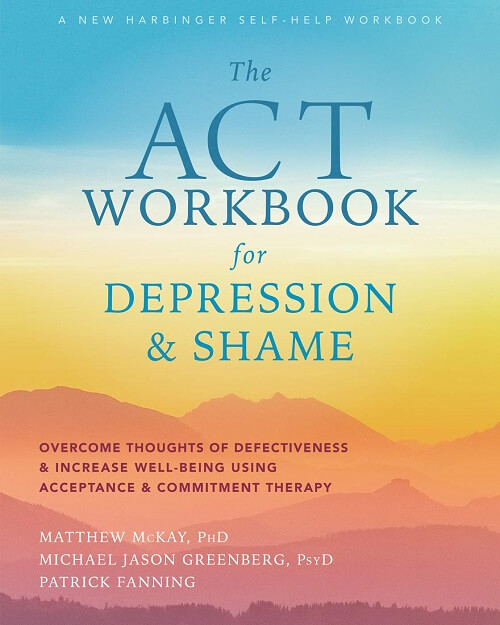
Opis wydawcy:
Conquer your self-defeating beliefs and create a more fulfilling life!
Do you feel like you’re broken? Are you depressed because you believe that you’re somehow defective, unwanted, or inferior? Do you feel self-conscious and insecure, constantly comparing yourself to others? Are you sensitive to criticism, or terrified of rejection?
Feeling flawed and inadequate often stems from negative childhood experiences. If you grew up in a highly critical environment, you might feel unworthy of being loved, or have a deep sense of shame about your perceived defects. You may tell yourself there is something inherently wrong with you that prevents you from forming satisfying relationships, finding happiness, and succeeding in life. So, how can free yourself from the self-defeating beliefs that keep you trapped in the depths of depression?
Grounded in evidence-based acceptance and commitment therapy (ACT), this workbook will give you the tools to identify and dismiss your core beliefs of personal defectiveness, and build a life based on positive choices and values that bring vitality and a sense of personal fulfillment. You’ll discover ways to develop psychological flexibility, freeing yourself from old habits and unhealthy coping mechanisms, and alleviating symptoms of depression. Finally, you’ll learn to see yourself in all your wonderful complexity, with kindness and compassion.
The truth is you are not broken, and painful memories of the past do not have to dictate your future. If you’re ready to heal and treat yourself to the care and compassion you deserve, this book will show you how.
Gottmans, Eight Dates: Essential Conversations for a Lifetime of Love

Uwielbiam The Gottman Institute i każdej parze zawsze polecam zapisać się na ich Marriage Minute, co potrafi zdziałać cuda dla związku.
Opis wydawcy:
Strengthen and deepen your love with a fun, ingenious program of eight life-changing conversations—on essential topics such as money, sex, and trust—from two of the world’s leading marriage researchers and clinicians.
Navigating the challenges of long-term commitment takes effort—and it just got simpler, with this empowering, step-by-step guide to communicating about the things that matter most to you and your partner. Drawing on forty years of research from their world-famous Love Lab, Dr. John Gottman and Dr. Julie Schwartz Gottman invite couples on eight fun, easy, and profoundly rewarding dates, each one focused on a make-or-break issue: trust, conflict, sex, money, family, adventure, spirituality, and dreams.
Interactive activities and prompts provide motivation to stay open, stay curious, and, most of all, stay talking to each other. And the range—from the four skills you need for intimate conversation (including Put Into Words What You Are Feeling) to tips on being honest about your needs, while also validating your partner’s own emotions—will resonate, whether you’re newly together or a longtime couple looking to fortify your bond. You will discover (or rediscover) your partner like never before—and be able to realize your hopes and dreams for the love you desire and deserve.
John M. Gottman, The Science of Trust: Emotional Attunement for Couples
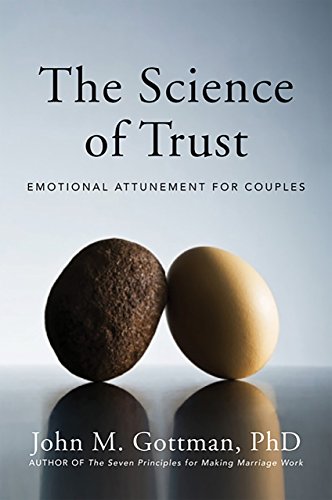
Częściowo naukowa, wręcz matematyczna książka, jednak kilka rozdziałów fenomenalnie wyjaśnia sposoby na budowanie i odbudowywanie zaufania.
Opis wydawcy:
For the past thirty-five years, John Gottman’s research has been internationally recognized for its unprecedented ability to precisely measure interactive processes in couples and to predict the long-term success or failure of relationships. In this groundbreaking book, he presents a new approach to understanding and changing couples: a fundamental social skill called “emotional attunement,” which describes a couple’s ability to fully process and move on from negative emotional events, ultimately creating a stronger relationship.
Gottman draws from this longitudinal research and theory to show how emotional attunement can downregulate negative affect, help couples focus on positive traits and memories, and even help prevent domestic violence. He offers a detailed intervention devised to cultivate attunement, thereby helping couples connect, respect, and show affection. Emotional attunement is extended to tackle the subjects of flooding, the story we tell ourselves about our relationship, conflict, personality, changing relationships, and gender. Gottman also explains how to create emotional attunement when it is missing, to lay a foundation that will carry the relationship through difficult times.
Gottman encourages couples to cultivate attunement through awareness, tolerance, understanding, non-defensive listening, and empathy. These qualities, he argues, inspire confidence in couples, and the sense that despite the inevitable struggles, the relationship is enduring and resilient.
This book, an essential follow-up to his 1999 The Marriage Clinic, offers therapists, students, and researchers detailed intervention for working with couples, and offers couples a roadmap to a stronger future together.
Amir Levine, Attached: The New Science of Adult Attachment and How It Can Help YouFind – and Keep – Love
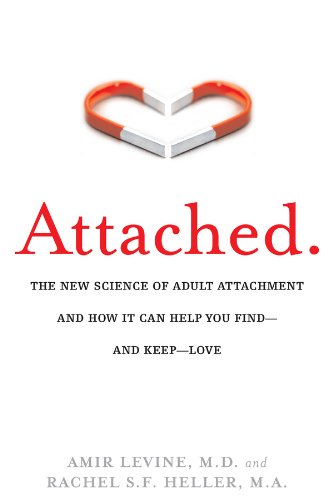
Niby o miłości, a w rzeczywistości ta książka pomogła mi lepiej zrozumieć nie tylko mój własny związek, ale też samą siebie.
Opis wydawcy:
We already rely on science to tell us what to eat, when to exercise, and how long to sleep. Why not use science to help us improve our relationships? In this revolutionary book, psychiatrist and neuroscientist Dr. Amir Levine and Rachel Heller scientifically explain why why some people seem to navigate relationships effortlessly, while others struggle.
Discover how an understanding of adult attachment—the most advanced relationship science in existence today—can help us find and sustain love. Pioneered by psychologist John Bowlby in the 1950s, the field of attachment posits that each of us behaves in relationships in one of three distinct ways:
• Anxious people are often preoccupied with their relationships and tend to worry about their partner’s ability to love them back
• Avoidant people equate intimacy with a loss of independence and constantly try to minimize closeness.
• Secure people feel comfortable with intimacy and are usually warm and loving.
Attached guides readers in determining what attachment style they and their mate (or potential mate) follow, offering a road map for building stronger, more fulfilling connections with the people they love.
Jeb Kinnison, Avoidant: How to Love (or Leave) a Dismissive Partner
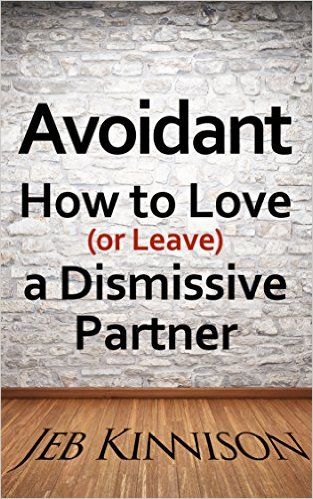
Opis wydawcy:
My previous book on finding a good partner by understanding attachment types (Bad Boyfriends: Using Attachment Theory to Avoid Mr. (or Ms.) Wrong and Make You a Better Partner) brought lots of readers to the JebKinnison web site, where the most asked-about topic was dealing with avoidant lovers and spouses. There are many readers in troubled marriages now who are looking for help, as well as people already invested in a relationship short of marriage who’d like help deciding if they should stick with it.
The reason why there is so much interest is the large number of people in relationships with Avoidants who struggle with their lack of responsiveness and inability to tolerate real intimacy. Relationships between an Avoidant and a partner of another attachment type are the largest group of unhappy relationships, and people who love their partners and who may have started families and had children with an Avoidant will work very hard to try to make their relationships work better, out of love for their partner and children as well as their own happiness. And it’s also true that the Avoidants in these relationships are more than likely unhappy with the situation as well–retreating into their shells and feeling harassed for being asked to respond with positive feeling when they have little to give.
The other reason why so many people are looking for help on this topic is that it is an almost impossible problem. Couples counsellors rarely have the time or knowledge to work with an Avoidant and will often advise the spouse to give up on a Dismissive, especially, whose lack of responsiveness looks like cruelty or contempt (and sometimes it is!) Yet there is some hope–though it may take years and require educating the Avoidant on the patterns of good couples communication, if both partners want to change their patterns toward more secure and satisfying models, it can be done.
Lisa Charlebois, Paul Meier, Cynthia Munz, You Might Be a Narcissist If… – How to Identify Narcissism in Ourselves and Others and What We Can Do About It
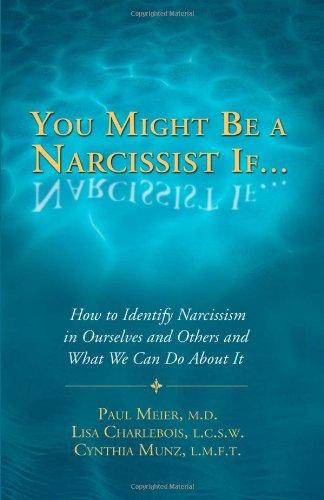
Opis wydawcy:
Why is this relationship so hard? It is so invigorating to know that we don’t have to stay stuck…even if we’re not the one struggling with narcissism…we can change the way we relate to the people who do.
Find out if the stress in your relationships with family, friends, or at work is unknowingly caused from narcissism in yourself or others… Narcissism is actually much more common than we may think and, in reality, most of us have some of these characteristics.
You Might Be a Narcissist If… was written by two psychotherapists and a psychiatrist with decades of both personal and professional experience with narcissism. It is filled with many interesting-to-read stories taken from the authors’ or their clients’ lives that clearly demonstrate examples of narcissism. A Narcissism Questionnaire and practical suggestions are given for dealing with narcissism whether it’s in your spouse, a co-worker, or even yourself.
Stan Tatkin, Wired for Love: How Understanding Your Partner’s Brain and Attachment Style Can Help You Defuse Conflict and Build a secure relationship
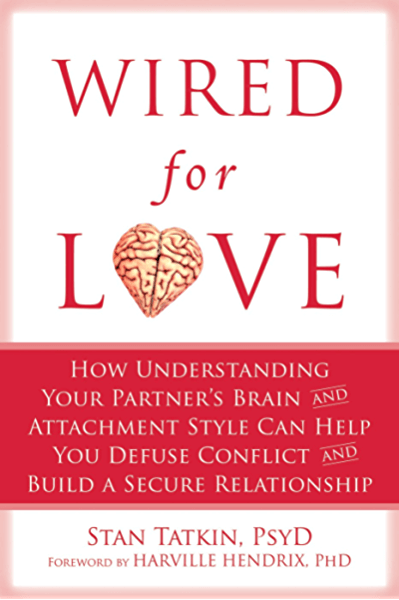
Opis wydawcy:
“What the heck is my partner thinking?” is a common refrain in romantic relationships, and with good reason. Every person is wired for love differently, with different habits, needs, and reactions to conflict. The good news is that most people’s minds work in predictable ways and respond well to security, attachment, and rituals, making it possible to actually neurologically prime the brain for greater love and fewer conflicts.
Wired for Love is a complete insider’s guide to understanding your partner’s brain and enjoying a romantic relationship built on love and trust. Synthesizing research findings on how and why love lasts drawn from neuroscience, attachment theory, and emotion regulation, this book presents ten guiding principles that can improve any relationship.
Strengthen your relationship by:
• Creating and maintaining a safe “couple bubble”
• Using morning and evening rituals to stay connected
• Learning to fight so that nobody loses
• Becoming the expert on what makes your partner feel loved
By learning to use simple gestures and words, readers can learn to put out emotional fires and help their partners feel more safe and secure. The no-fault view of conflict in this book encourages readers to move past a “warring brain” mentality and toward a more cooperative “loving brain” understanding of the relationship. This book is essential reading for couples and others interested in understanding the complex dynamics at work behind love and trust in intimate relationships.
While there’s no doubt that love is an inexact science, if you can discover how you and your partner are wired differently, you can overcome your differences to create a lasting intimate connection.
